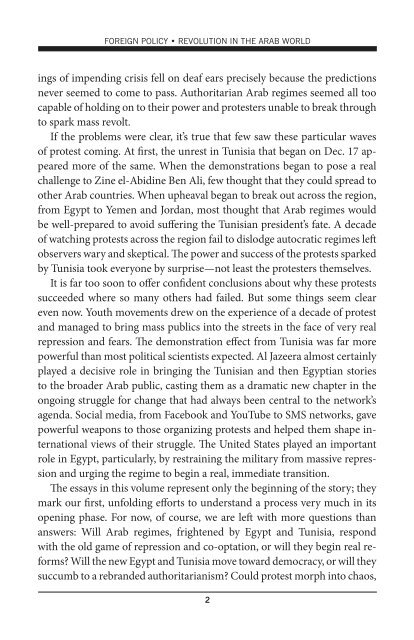Revolution in the Arab World - Observation of a lost soul Blog
Revolution in the Arab World - Observation of a lost soul Blog
Revolution in the Arab World - Observation of a lost soul Blog
Create successful ePaper yourself
Turn your PDF publications into a flip-book with our unique Google optimized e-Paper software.
foreign policy • revolution <strong>in</strong> <strong>the</strong> arab world<br />
<strong>in</strong>gs <strong>of</strong> impend<strong>in</strong>g crisis fell on deaf ears precisely because <strong>the</strong> predictions<br />
never seemed to come to pass. Authoritarian <strong>Arab</strong> regimes seemed all too<br />
capable <strong>of</strong> hold<strong>in</strong>g on to <strong>the</strong>ir power and protesters unable to break through<br />
to spark mass revolt.<br />
If <strong>the</strong> problems were clear, it’s true that few saw <strong>the</strong>se particular waves<br />
<strong>of</strong> protest com<strong>in</strong>g. At first, <strong>the</strong> unrest <strong>in</strong> Tunisia that began on Dec. 17 appeared<br />
more <strong>of</strong> <strong>the</strong> same. When <strong>the</strong> demonstrations began to pose a real<br />
challenge to Z<strong>in</strong>e el-Abid<strong>in</strong>e Ben Ali, few thought that <strong>the</strong>y could spread to<br />
o<strong>the</strong>r <strong>Arab</strong> countries. When upheaval began to break out across <strong>the</strong> region,<br />
from Egypt to Yemen and Jordan, most thought that <strong>Arab</strong> regimes would<br />
be well-prepared to avoid suffer<strong>in</strong>g <strong>the</strong> Tunisian president’s fate. A decade<br />
<strong>of</strong> watch<strong>in</strong>g protests across <strong>the</strong> region fail to dislodge autocratic regimes left<br />
observers wary and skeptical. The power and success <strong>of</strong> <strong>the</strong> protests sparked<br />
by Tunisia took everyone by surprise—not least <strong>the</strong> protesters <strong>the</strong>mselves.<br />
It is far too soon to <strong>of</strong>fer confident conclusions about why <strong>the</strong>se protests<br />
succeeded where so many o<strong>the</strong>rs had failed. But some th<strong>in</strong>gs seem clear<br />
even now. Youth movements drew on <strong>the</strong> experience <strong>of</strong> a decade <strong>of</strong> protest<br />
and managed to br<strong>in</strong>g mass publics <strong>in</strong>to <strong>the</strong> streets <strong>in</strong> <strong>the</strong> face <strong>of</strong> very real<br />
repression and fears. The demonstration effect from Tunisia was far more<br />
powerful than most political scientists expected. Al Jazeera almost certa<strong>in</strong>ly<br />
played a decisive role <strong>in</strong> br<strong>in</strong>g<strong>in</strong>g <strong>the</strong> Tunisian and <strong>the</strong>n Egyptian stories<br />
to <strong>the</strong> broader <strong>Arab</strong> public, cast<strong>in</strong>g <strong>the</strong>m as a dramatic new chapter <strong>in</strong> <strong>the</strong><br />
ongo<strong>in</strong>g struggle for change that had always been central to <strong>the</strong> network’s<br />
agenda. Social media, from Facebook and YouTube to SMS networks, gave<br />
powerful weapons to those organiz<strong>in</strong>g protests and helped <strong>the</strong>m shape <strong>in</strong>ternational<br />
views <strong>of</strong> <strong>the</strong>ir struggle. The United States played an important<br />
role <strong>in</strong> Egypt, particularly, by restra<strong>in</strong><strong>in</strong>g <strong>the</strong> military from massive repression<br />
and urg<strong>in</strong>g <strong>the</strong> regime to beg<strong>in</strong> a real, immediate transition.<br />
The essays <strong>in</strong> this volume represent only <strong>the</strong> beg<strong>in</strong>n<strong>in</strong>g <strong>of</strong> <strong>the</strong> story; <strong>the</strong>y<br />
mark our first, unfold<strong>in</strong>g efforts to understand a process very much <strong>in</strong> its<br />
open<strong>in</strong>g phase. For now, <strong>of</strong> course, we are left with more questions than<br />
answers: Will <strong>Arab</strong> regimes, frightened by Egypt and Tunisia, respond<br />
with <strong>the</strong> old game <strong>of</strong> repression and co-optation, or will <strong>the</strong>y beg<strong>in</strong> real reforms<br />
Will <strong>the</strong> new Egypt and Tunisia move toward democracy, or will <strong>the</strong>y<br />
succumb to a rebranded authoritarianism Could protest morph <strong>in</strong>to chaos,<br />
2




